12 start with E start with E
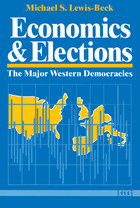
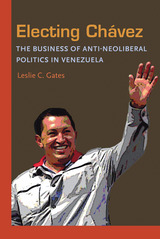
In Electing Chávez, Leslie C. Gates examines how Chávez won over voters and even obtained the secret allegiance of a group of business “elite outliers,” with a reinterpretation of the relationship between business and the state during Venezuela’s era of two-party dominance (1959-1998). Through extensive research on corruption and the backgrounds of political leaders.
Gates tracks the rise of business-related corruption scandals and documents how business became identified with Venezuela’s political establishment. These trends undermined the public’s trust in business and converted business opposition into an asset for Chávez. This long history of business-tied politicians and the scandals they often provoked also framed the decisions of elite outliers. As Gates reveals, elite outliers supported Chávez despite his anti-neoliberal stance because they feared that the success of Chávez’s main rival would deny them access to Venezuela’s powerful oil state.

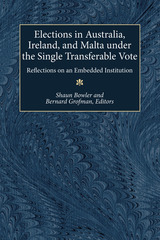
Contributors to the volume are Shaun Bowler, David Farrell, Michael Gallagher, Bernard Grofman, Wolfgang Hirczy, Colin Hughes, J. Paul Johnston, Michael Laver, Malcom Mackerras, Michael Maley, Michael Marsh, Ian McAllister, and Ben Reilly.
Shaun Bowler is Professor of Political Science, University of California, Riverside. Bernard Grofman is Professor of Political Science, University of California, Irvine.
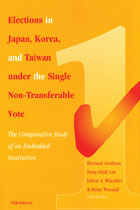
In addition to the editors, the contributors include Kathleen Bawn, John Boland, Jean-Marie Bouissou, Gary Cox, John Fu-Sheng Hsieh, Arend Lijphart, Emerson Niou, Steven R. Reed, and Frances Rosenbluth, among others.
Bernard Grofman is Professor of Political Science, University of California at Irvine. Edwin A. Winckler is at the East Asian Institute, Columbia University. Brian Woodall is Assistant Professor in the School of International Affairs, Georgia Institute of Technology. Sung-Chull Lee is Assistant Professor of Political Science, University of California at Irvine.
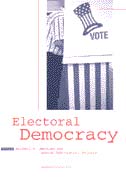
Michael B. MacKuen is Burton Craige Professor of Political Science at the University of North Carolina. George Rabinowitz is Burton Craige Professor of Political Science at the University of North Carolina.
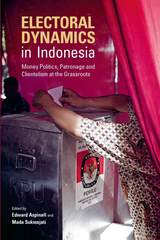
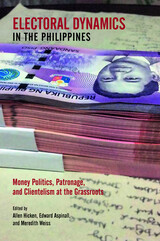
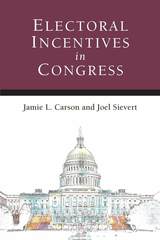
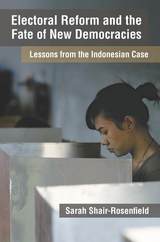
When and why do democratic political actors change the electoral rules, particularly regarding who is included in a country’s political representation? The incidences of these major electoral reforms have been on the rise since 1980.
Electoral Reform and the Fate of New Democracies argues that elite inexperience may constrain self-interest and lead elites to undertake incremental approaches to reform, aiding the process of democratic consolidation. Using a multimethods approach, the book examines three consecutive periods of reform in Indonesia, the world’s largest Muslim majority country and third largest democracy, between 1999 and 2014. Each case study provides an in-depth process tracing of the negotiations leading to new reforms, including key actors in the legislature, domestic civil society, international experts, and government bureaucrats. A series of counterfactual analyses assess the impact the reforms had on actual election outcomes, versus the possible alternative outcomes of different reform options discussed during negotiations. With a comparative analysis of nine cases of iterated reform processes in other new democracies, the book confirms the lessons from the Indonesian case and highlights key lessons for scholars and electoral engineers.
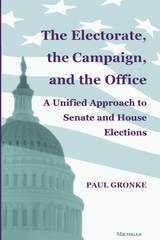
Congressional elections research holds that Senate races are more competitive than House contests because states are more heterogeneous, or because candidates are more prominent and raise more money, or because voters have fundamentally different expectations. Because House and Senate contests are seldom compared, we have little empirical evidence to test the various hypotheses about how voters make choices for different offices. Gronke finds that the similarities between House and Senate elections are much greater than previously thought and that voters make their decisions in both races on the same bases.
Gronke first looks at differences in congressional districts and states, showing that context does not really help us understand why Senate elections feature better candidates, higher spending, and closer outcomes. Next, he turns to campaigns. Surprisingly, over a turbulent twenty-year period, House and Senate candidacies have retained the same competitive dynamics.
Gronke also considers voting behavior in House and Senate elections. Focusing on the 1988 and 1990 elections, he argues that voters do not distinguish between institutions, applying fundamentally the same decision rule, regardless of the office being contested. Gronke closes by considering the implications of his results for the way we relate settings, electoral dynamics, and institutional arrangements.
This book will appeal to those interested in Congress, political campaigning, and voting.
Paul Gronke is Associate Professor of Political Science at Reed College.
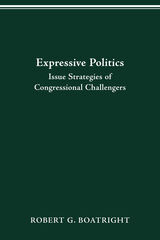
This research makes two types of contributions to existing political science literature. On a theoretical level, it argues for a reconceptualization of the motives of candidates and parties in rational choice analysis. On a practical level, it seeks to enrich our understanding of the role that challengers play in American elections and of the reason why different types of challengers emerge in different types of elections. Boatright argues that the role of challengers in the American electoral process can be understood only if we broaden our theories about rational candidate behavior.
READERS
Browse our collection.
PUBLISHERS
See BiblioVault's publisher services.
STUDENT SERVICES
Files for college accessibility offices.
UChicago Accessibility Resources
home | accessibility | search | about | contact us
BiblioVault ® 2001 - 2024
The University of Chicago Press









